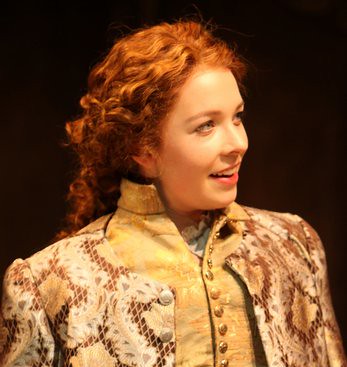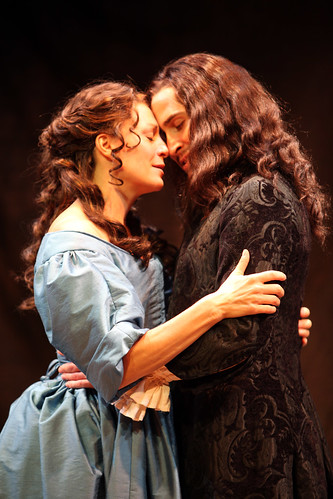Opened July 14, 2008 at Traveling Jewish Theater (show moves to the Ashby Stage Aug. 15-31)

Juliet Tanner plays the title character in The Listener, a world-premiere play by Liz Duffy Adams and presented by Crowded Fire Theater Company. Photos by Melpomene Katakalos
`Listener’ spins junk into a sci-fi jumble
«« ½
Liz Duffy Adams’ world-premiere play The Listener could very easily take place in the same landscape as the hit summer film WALL-E. Both imagine a post-apocalyptic Earth destroyed by the human need to acquire stuff without any sense of responsibility toward the planet.
Both the play and the movie create a bleak landscape of garbage towers and a world so uninhabitable that humans have had to flee to other parts of the universe for survival.
Instead of a cute little robot left to pick up the mess, playwright Adams creates a race of savages — those left behind to forge a life where there should be no life, while the so-called “civilized” humans have learned to make the moon hospitable to human life and dubbed the once-barren satellite Nearth, or New Earth.
This is the third collaboration between Crowded Fire Theatre Company and Adams following The Train Play in 2003 and the fantastic musical One Big Lie in 2005, and it’s probably the least interesting. It bears some resemblance to Adams’ award-winning Dog Act, which Shotgun Players produced in 2004, in that it takes place after the apocalypse and uses malapropisms and jumbled cultural references to demonstrate the evolution – or devolution as the case may be – of language in a world without order.
Duffy’s use of language is less complex here. The characters who use her poetic slang the most are rag-tag “finders,” low-level scavengers who search through the piles of garbage that comprise Junk City to find anything useful or mysterious. Smak (Michael Moran) and Jelly (Rami Margron), when they’re not “frugging” each other silly, take their treasures to Namer (Lawrence Radecker), a sort of spiritual leader who holds the story of their ravaged world’s “creation,” and shares his knowledge by naming the junk. An old board, for instance, is named “lumbar,” and an old battery is called a “juice box.”
The other person of power in Junk City is Listener (Juliet Tanner), who operates a radio and regularly transmits messages to “others” she hopes might be listening. Hers is a position passed down through the six generations since the apocalypse, and all she does is sit in her junk house operating the radio.

Into the junk pile one day comes a man from the moon, a lunatic or looney as the Finders call him. He’s part of a liberal faction that regrets having left anyone on the poisoned earth and has come back to engineer their rescue. “We’re sorry we left you,” he says. “Some of us are.”
The visitor, John (Cole Alexander Smith, above center with Margron and Moran), is captured by the Finders and treated like a dog. Namer doesn’t believe the man’s story and instead tells his own version of what happened to the planet. This is one of the play’s highlights as he spins out a tale of Sam (as in Uncle Sam) and his giant mall. “In the beginning there was Tech,” Namer says.
Listener is intrigued by the visitor and gives him safe haven in the hope that he might boost the signal of her radio even though inventing new tech is strictly forbidden in Junk City. So begins the love story aspect of the play.
My problem with science fiction in the theater is that a stage, especially a small one like the Traveling Jewish Theater stage, can’t contain a large enough world to satisfy our curiosity about this new and different world. The limits of the stage, especially in a literal tale such as this one, limit the story…
Set designer Melpomene Katakalos gives us a stage heaped with junk – some of it beautiful like the stained-glass window made of soda bottle bottoms in Namer’s house — but in many ways, it looks like the set for Cats. Midnight, not a sound from the pavement and all that. One theatrical junk heap looks very much like another.
Where does the electricity for Namer’s machine come from? Where does the food come from and the water? We hear it rain and are told about greenery taking over the junk piles, but we see little evidence of natural life outside the junk heap. Are there animals in this world? And just who are the Jimmys we keep hearing about? And why are there only two Finders?
When John lands in his spaceship, he only brings more questions. If he, like most of the people on the moon, believe the Earth to be a toxic, cancer-causing heap populated by a dwindling race of savages, why did he come alone and unarmed? And in the near future, when traveling through space to a hostile environment, is a traditional gas mask really the best technology available?
Director Kent Nicholson’s cast finds levels of humor in the message-laden sci-fi, but some of them can’t help but come across as silly because Duffy’s play lays it on so thick. Hearing the Finders talk about the “demagogues” such as Okrah (the god of wisdom and bounty), Thump (the god of building who shoots fire as in “You’re fired”) and My Donna (as in “Like a Virgin”) and Elvisto the Christo is cringe-inducing.
The Listener, which aims to unearth hope in the bleakness through the character of Listener (played with enigmatic, understated power by Tanner), delves into melodramatic violence to reach its inevitable conclusion and leaves the stories of Namer, Jelly and Smak dangling in space.
The Listener continues through Aug. 3 at Traveling Jewish Theater, 470 Florida St., San Francisco. Tickets are $15-$25. The show moves to the Ashby Stage, 1901 Ashby Ave., Berkeley, Aug. 15-31. Call 415-433-1235 or visit www.crowdedfire.org for information.





